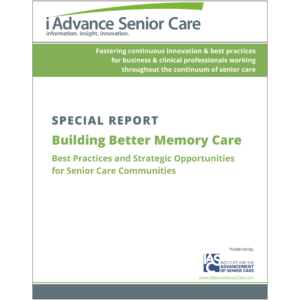One-on-one with…Paul Nussbaum, PhD
Brookdale Senior Living recently named Paul Nussbaum, PhD, its national director for brain health. Long-Term Living Senior Editor Lois A. Bowers spoke with the board-certified psychologist to find out more about what he’s doing for the company, which has nearly 1,150 senior living communities in 46 states and calls itself the country’s largest provider of Alzheimer’s and dementia care.
What programs are you implementing at Brookdale?
I’ve been asked to contribute in two major areas: brain health—that is for everyone—and dementia and memory care. Some of the major lifestyle pillars of our approach to brain health are nutrition, physical activity, mental stimulation, spirituality and socialization. Even a person with Alzheimer’s disease can benefit from the kinds of activities and behaviors and environments that include those important parts of brain health.
And this is not just about creating an environment internal to Brookdale. That’s really important, as we have an opportunity to serve as a catalyst for the rest of the country. Millions and millions of Americans can benefit from the information and from the application of the brain health programming that we’re building at Brookdale.
How will you be broadening Brookdale’s cognitive fitness programs?
For cognitive health, for instance, we want to make sure that it is appreciated for everybody across entire landscape of Brookdale, not just those who are suffering from diseases. Then from there we want to make sure that we have standards in place so that scientifically valid assessments provide us with useful information to create programming that can be used throughout the entire system.
In terms of brain health, my approach is a lifestyle approach, which fits very well with Brookdale’s trademarked Optimum Life approach. The brain is not just a cognitive system. It’s also an emotional system. It’s a motor system, a creative system and a spiritual system. We want to create an environment where people work and live a life that is very enriching to the brain.
So that’s the 30,000-foot view of the broadening of our approach. It all begins with education. People have to be educated in some of the basics of the human brain. Not in a neuroscientific way, per se, but in a way that people can really appreciate the miracle that sits between their ears and how it works and feel empowered by what we’ve learned from research about what we can do to shape our brains regardless of our age.
On a practical level, coming down from 30,000 feet, what will this mean for staff and residents at Brookdale?
Let’s use nutrition as an example. We take the information we’ve learned from the science of food and how it is supplied to the brain, and we begin to apply it to the kinds of food that can be given as options for residents, and those options can find their way into staff lounges, too. Rather than having chips out on the table, why don’t we have foods that are really healthy for the brain—walnuts and blueberries and those kinds of things? That’s the way a culture begins to shift. That’s just an example within the segment of nutrition. We also may be getting into using pedometers, encouraging walking on a daily basis and encouraging physical fitness in ways that people understand are not just good for the heart but very good for the brain. Every time your hearts beats, 25 percent of the blood goes right to the brain. When you educate people, then being physically active begins to make sense, because the more physically active we are, the better our memory functions, the happier our brain cell are and the more emotionally positively we feel.
You’ve been studying the brain, brain health, cognition and the elderly for many years now. How do you think our understanding of cognition and brain health has changed over the years, and how has the approach to address it adapted based on this understanding?
Certainly, with advanced technologies such as scanners, we’ve learned more and more about the structure and the function of the brain, and that’s been very, very helpful. Over the past two decades, we’ve learned more about the brain than in the entire history of our civilization, so that tells you how fast things are moving. One of the things I think we appreciate more now is that, just because you get older doesn’t mean you’re diseased or limited. In fact, we have brains that are able to continue to produce regardless of age. Chronological age is all made up. The brain doesn’t know how old it is; it just wants to be stimulated. So I think that’s a little bit of a shift. We’re not always demeaning to a person just because he or she is older. There’s a respect and wisdom that comes along, as well as continued innovation and creativity from older brains.
When I talk to you about brain health, it will be very rare that I say anything to you about disease or clinical conditions. I’m more interested in human performance and maximizing human potential and you feeling good about who you are and those kinds of things. In 2002, we began to put the words brain and health together, and in the past 13 years, there’s been a pretty big paradigm shift. We know so much more than we have before in terms of lifestyle and its importance on the brain. Although we have a long way to go, I think one of the big changes is that consumers are more empowered with information. They understand there are certain things we can do to promote the health of our brain. Ultimately, consumers are empowered to live a brain health lifestyle so that they maximize their ability to maintain access to their life story, the most precious gift we have.

Lois A. Bowers was senior editor of I Advance Senior Care / Long-Term Living from 2013-2015.
Related Articles
Topics: Activities , Alzheimer's/Dementia , Articles , Nutrition











